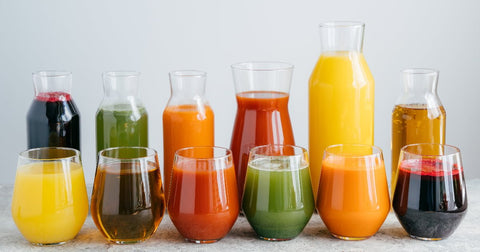Feeling sluggish? Craving a pick-me-up without the jitters and caffeine crash? You're not alone! Many women are seeking healthier alternatives to their daily caffeine fix. The good news is that your body has natural energy pathways just waiting to be tapped into. Let's explore strategies for sustained energy without caffeine, focusing on diet, lifestyle, and the potential impact of food intolerances.

How to Stay Awake Without Caffeine: Harnessing Your Body's Power
1. Fuel Up with Balanced Meals:
- Skip the Sugar Rush: Avoid simple carbohydrates like sugary snacks or white bread, which cause energy spikes followed by crashes.
- Embrace Complex Carbs: Opt for whole grains (oats, quinoa, brown rice), legumes, and vegetables for sustained energy release.
- Power Up with Protein: Protein helps regulate blood sugar levels and prevents energy dips. Include lean meats, fish, eggs, beans, or tofu in your meals.
- Don't Skip Meals: Regular eating patterns maintain stable blood sugar levels and prevent energy slumps.
2. Hydrate, Hydrate, Hydrate:

- Water Works Wonders: Dehydration is a major energy drainer. Carry a water bottle and sip throughout the day, especially if you're active or in warm climates.
3. Move Your Body:
- Exercise is Energy: Even a brisk walk or a quick yoga session can increase blood flow, oxygenate your body, and boost energy levels.
- Sneak in Activity: Take the stairs instead of the elevator, park further away, and find ways to move throughout your day.
4. Prioritize Sleep:
- Recharge Your Batteries: Aim for 7-8 hours of quality sleep each night. Poor sleep disrupts hormone balance, impacting energy levels.
- Establish a Routine: Go to bed and wake up at the same time each day to regulate your sleep-wake cycle.
5. Harness the Power of Sunlight:
- Natural Vitamin D: Sunlight helps your body produce vitamin D, essential for energy production and mood regulation.
- Step Outside: Enjoy some sunshine each day, but be mindful of sun protection during peak hours.
How to Get Instant Energy Without Caffeine: Quick Tricks

If you need an immediate boost, try these caffeine-free hacks:
- Splash of Cold Water: A quick splash on your face or a cold shower can wake you up and increase alertness.
- Essential Oils: Peppermint or citrus scents can be invigorating.
- B Vitamins: These play a role in energy production. Consider a B-complex supplement after consulting with your doctor.
Can Food Intolerances Cause Fatigue?
Yes! Hidden food sensitivities can trigger inflammation and hinder nutrient absorption, leaving you feeling tired and drained.
- Unmask Your Triggers: Our food sensitivity test kit can help identify problematic foods. Eliminating them could be your key to unlocking more energy.
How to Make Up Without Caffeine: Long-Term Strategies

If you're looking to break free from the caffeine cycle, here are some tips:
- Gradual Reduction: Don't quit cold turkey. Gradually reduce your caffeine intake to minimize withdrawal symptoms.
- Explore Alternatives: Try herbal teas, decaffeinated coffee, or other naturally energizing drinks like coconut water.
Disclaimer:This information is intended for educational purposes only and should not be taken as medical advice. Consult your doctor before making any major dietary or lifestyle changes.
Frequently Asked Questions:
1. I'm trying to cut back on caffeine, but I'm always tired. Will these tips really work?
Yes, they can! It might take time for your body to adjust to less caffeine, but incorporating these strategies consistently can lead to more sustained energy levels without relying on stimulants.
2. Which foods provide the most long-lasting energy without caffeine?
Focus on complex carbohydrates like whole grains, legumes, and vegetables. These release energy slowly, preventing crashes. Pair them with lean protein and healthy fats for optimal energy levels.
3. I'm always getting sick. Could a food intolerance be contributing to my low energy?
It's definitely possible! Food sensitivities can trigger inflammation and hinder nutrient absorption, leaving you feeling tired and run down. Our food intolerance test can help you identify potential triggers so you can adjust your diet for better energy and overall health.
4. How much water should I drink for optimal energy levels?
Aim to drink at least 8 glasses of water per day, but this can vary depending on your activity level, climate, and individual needs. Listen to your body's thirst cues and make sure you're drinking enough to stay hydrated, especially in the hot Miami weather.
5. Is it really necessary to exercise for energy? I'm already tired!
It might seem counterintuitive, but exercise is actually a great way to boost energy levels. Even a short walk or gentle yoga session can increase blood flow and oxygen delivery to your muscles and brain, leaving you feeling revitalized.


.png?v=1737390083)
.png?v=1737187409)


